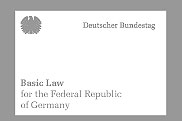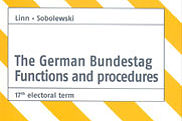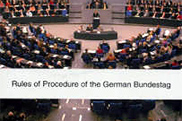Legal framework for the German Parliament
The Basic Law
The Basic Law is the constitution of the Federal Republic of Germany. It lays down the fundamental structure and essential values of the state. Among other things, the Basic Law defines the principles according to which the elections to the German Bundestag are conducted. It provides the basis for the status and rights of Parliament’s freely elected Members and outlines how the German Parliament should be organised and carry out its business.
Rules of Procedure
The Ende Original-Link -->Rules of Procedure of the German Bundestag regulate the organisation and working methods of the German Parliament in detail.
Act Governing the Legal Framework for Committees of Inquiry
Committees of inquiry primarily examine possible cases of misgovernment, maladministration and misconduct on the part of politicians. The Act Governing the Legal Framework for Committees of Inquiry regulates the rights of these committees.
Act on the Legal Status of Members of the German Bundestag
The Act on the Legal Status of Members of the German Bundestag lays down the rights and duties of the Members of the German Bundestag. It guarantees Members the free exercise of their mandates and regulates the benefits to which they are entitled. The text also includes the Members of the European Parliament Act.
Electoral legislation
The conduct of elections to the German Bundestag is regulated by the Federal Electoral Act in conjunction with the Federal Electoral Code and its Annexes. The validity of elections to the Bundestag is reviewed in accordance with the Act on the Scrutiny of Elections.
Act on Political Parties
The Act on Political Parties regulates the rights of political parties in Germany, setting out statutory guidelines for the parties’ democratic structures and the funding they receive from the state.
Code of Conduct for Members of the German Bundestag
The Code of Conduct regulates the disclosure of certain activities pursued alongside the exercise of the mandate. Furthermore, it contains provisions concerning donations and other benefits received by Members of the Bundestag in respect of their political activity as well as gifts received by Members from guests or hosts.





